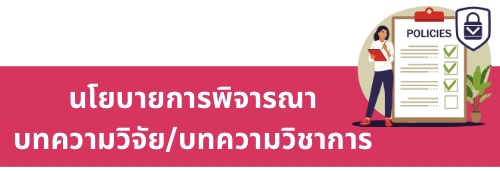บทบาทพยาบาลในการบำบัดผู้มีภาวะสมองเสื่อมโดยไม่ใช้ยา
คำสำคัญ:
การบำบัดโดยไม่ใช้ยา, สมองเสื่อม, บทบาทพยาบาลบทคัดย่อ
ภาวะสมองเสื่อมเป็นหนึ่งในความผิดปกติของระบบประสาทที่พบบ่อยที่สุดในผู้สูงอายุที่มีความบกพร่องทางการคิดรู้และสติปัญญาซึ่งเกิดจากความผิดปกติของสมอง อุบัติการณ์ของภาวะสมองเสื่อมเพิ่มขึ้นตามอายุ เนื่องจากประเทศไทยเข้าสู่สังคมผู้สูงอายุอย่างเต็มตัว ผู้มีภาวะสมองเสื่อมจึงมีจำนวนมากขึ้นตามไปด้วย จำเป็นต้องตระหนักถึงความสำคัญของการดูแลผู้มีภาวะสมองเสื่อมและเป็นความท้าทายของพยาบาล บทความนี้กล่าวถึงบทบาทของพยาบาลในแนวทางปฏิบัติที่ใช้หลักฐานเชิงประจักษ์สำหรับการรักษาแบบไม่ใช้ยาในผู้มีภาวะสมองเสื่อม ซึ่งเป็นบทบาทอิสระในขอบเขตของการพยาบาลในการดูแลผู้มีภาวะสมองเสื่อมตามกระบวนการพยาบาลแบบองค์รวมในระยะต่าง ๆ ของการบำบัด เพื่อเป็นแนวทางการดูแลต่อเนื่องอันส่งผลต่อการมีคุณภาพชีวิตที่ดีของผู้มีภาวะสมองเสื่อมและครอบครัว
Downloads
เอกสารอ้างอิง
Abraha, I., Rimland, J. M., Trotta, F. M., Dell'Aquila, G., Cruz-Jentoft, A., & Petrovic, M. (2017). Systematic review of systematic reviews of non-pharmacological interventions to treat behavioural disturbances in older patients with dementia. BMJ open, 7(3), 1-28.
Agusman, F., Hani, U., & Iswanti, D. (2020). Environmental management to control behavioral and emotional problems in elderly with dementia. International Journal of Public Health and Health Sciences, 2(1), 9-21.
Alzheimer's Disease International. (2019). World alzheimer report 2019: Attitudes to dementia. Retrieved from https://www.alz.co.uk/research/world-report-2019
American Psychiatric Association. (2013). Diagnostic and statistical manual of mental disorders (5th ed.). Arlington VA: American Psychiatric Association.
Anundilokrit, P. (2021). Dementia. Regional Health Promotion Center9 Journal, 15(37), 392-398.
Berg-Weger, M., & Stewart, D. B. (2017). Non-Pharmacologic Interventions for Persons with Dementia. Missouri Medicine, 114(2), 116-119.
Charoensak, S. (2015). Chapter 29: Major Neurocognitive disorder and mild neurocognitive disorder. In N. Sitdhiraksa, K. Wannasewok, K. Wannarit, P. Pukrittayakamee, S. Apinuntavech, & P. Katumarn, (Eds.), Siriraj psychiatry DSM-5 (pp.349-363) (2nd ed.). Bangkok, Prayulsanthai.
Foundation of Thai Gerontology Research and Development institute (TGRI). (2022). Situation of the Thai older persons 2021. Nakhon Pathom: Institute for Population and Social Research Mahidol University.
Hemrungrojn, S. (2011). Montreal cognitive assessment (MOCA). Retrieved from http://www.mocatest.org/pdf_files/test/MoCA-Test-Thai.pdf
Lodha, P., & Desousa, A. (2019). Non pharmacological management of dementia: A review. Indian Journal of Private Psychiatry, 13(2), 62–70.
Lui, Z., Chen, Q. I., & Sun, Y. Y. (2017). Mindfulness training for psychological stress in family caregivers of persons with dementia: A systematic review and meta-analysis of randomized controlled trials. Clinical Interview Aging, 12, 1521-1529.
Meyer, C., & O’Keefe, F. (2020). Non-pharmacological interventions for people with dementia: A review of reviews. Dementia, 19(6), 1927-1954.
Muangpaisan, W. (2016). Dementia: Prevention, assessment, and care. Bangkok: Parbpim.
Neurological Institute of Thailand. (2015). Chapter 2: Management of cognitive impairment. In T. Tantirittisak, (Eds.), Clinical practice guidelines: Dementia (pp.23-32). Bangkok, Tanapress.
Parra-Anguita, L., Lopez-Franco, M. D., Del-Pino-Casado, R., Garcia-Fernandez, F. P., & Pancorbo-Hidalgo, P. L. (2022). Undergraduate nursing students' knowledge of Alzheimer's disease and related dementias care. Journal of Professional Nursing, 39, 101-108.
Sirikampeng, A. (2017). The long term care for the elderly dependency on Thailand country 4.0 era. Dhammathas Academic Journal, 17(3), 235-243.
Surawan, W. (2017). Prevalence of dementia and factor associated with dementia in elderly, Nam-Phong district, Khonkaen province. KKU Journal for Public Health Research, 10(2), 58-69.
Taemeeyapradit, U., Tanchaiswad, W., Hangsprueg, C., & Phunsiri, O. (1990). Mini-mental state examination (MMSE): A screening test for organic brain syndrome. Journal of psychiatry Association Thailand, 35(4), 208-216.
Wang, J., Zhang, G., Min, M., Xing, Y., Chen, H., Li, C., Li, C., Zhou, H., & Li, X. (2022). Developing a non -pharmacological intervention programme for wandering in people with dementia: Recommendations for healthcare providers in nursing homes. Brain sciences, 12, 1321-1341.
WHO. (2020). Dementia. Retrieved from https://www.who.int/news-room/factsheets/detail/dementia
Yue, S., Mengmeng, J., Minmin, L., Xinrui, L., Xueer, Z., & Zhiwen, W. (2022). Comparative efficacy of 11 non-pharmacological interventions on depression, anxiety, quality of life, and caregiver burden for informal caregivers of people with dementia: A systematic review and network meta-analysis. International Journal of Nursing Studies, 129, 1-13.

ดาวน์โหลด
เผยแพร่แล้ว
รูปแบบการอ้างอิง
ฉบับ
ประเภทบทความ
สัญญาอนุญาต
ลิขสิทธิ์ (c) 2022 วารสารพยาบาลตำรวจ

อนุญาตภายใต้เงื่อนไข Creative Commons Attribution-NonCommercial-NoDerivatives 4.0 International License.
ผลงานที่ได้ตีพิมพ์แล้วจะเป็นลิขสิทธิ์ของวารสารพยาบาลตำรวจ














